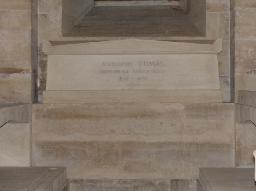Dumas, Alexandre (père) |
| WRITER (FRANCE) |
|
BORN 24 Jul 1802, Villers-Cotterêts, Aisne - DIED 9 Dec 1870, Puys, Normandie (near Dieppe) BIRTH NAME Pailleterie, Dumas Davi de la GRAVE LOCATION Paris: Panthéon (Caveau XXIV) |
|
Alexandre Dumas was the son of General Thomas-Alexandre Dumas Davy de la Pailleterie (1762-1806), who came from Saint-Domingue (now Haiti). His mother Marie-Louise Élisabeth Labouret was the daughter of an innkeeper. In 1806 his father died. He was educated at the college of Abbot Grégoire in Villers-Cotterêts until 1813. In 1819 he was introduced to modern poetry by Adolphe de Leuven (1802-1884) and together they started writing dramas and vaudevilles that were intially refused. In 1822 he went to Paris where he worked as a notaty clerk. General Foy helped him to a job in the office of the Duke of Orléans and this enabled him to bring his mother to Paris as well. By that time he had met the actor Talma. In Paris he was often the victim of racism. From his affair with the seamstress Laure Labay (1793-1868) a son was born, Alexandre, who like his father would become a famous writer. Dumas recognized him only in 1831. In 1828 he wrote the play "Henri III et sa cour" and it was performed at the Comédie-Française on 10 February 1829. It was a great success and it was followed by "Antony" in 1831. In 1832 he travelled to Switzerland, where he met Chateaubriand. He also visited Northen Italy and more visits to Italy followed. In 1838 he also travelled to Germany and Balgium. In 1840 he married Ida Ferrier. In 1844 he published "Les Trois Mousquetaires" as a feuilleton in the paper "Le Siècle" and it increased that paper's sales. From 1844 to 1850 he wrote many further works, including "La Reine Margot " (1844-1845) and "Le Comte de Monte-Cristo" (1844-1846). In 1846 he built his own theatre in Paris that he named "Théâtre-Historique". It went bankrupt in 1850. His work earned him a huge income, but he spent even more on his mistresses and his friends. The revolution of 1848 interrupted his income and he lost as a candidate in Yonne for the legislative elections. He had separated from Ida who asked him for a pension and he was forced to sell his Château de Monte-Cristo. In 1851 he was almost bankrupt and he went into exile in Brussels with Victor Hugo as a protest against the coup d'état of Napoleon III. In 1853 he transferred part of the rights of his literary propery to his creditors and after that he lived partly in Paris and partly in Brussels. In April 1857 he visited Victor Hugo on Guernsey. He published the newspaper Le Monte-Cristo from 1857 to 1860. In 1859 he travelled to Russia and to the Caucasus and he published his experiences. In 1860 he sold his posessions to buy weapons for Garibaldi in Italy. He went to Sicily to deliver the weapons and he was present when Garibaldi entered Naples on 7 September 1860. In December 1860 he had a daughter from the actress Émélie Cordier, Micaëlla-Clélie-Josepha-Élisabeth Cordier. From 1861 to 1864 he was the director of the Pompeii excavations in Naples. In 1864 he returned to France where he lived in Enghien for a while with a singer. After they separated he returned to Paris. He continued writing and in 1865-1866 he gave lectures as well. In 1867 he met the American actress Adah Isaacs Menken (1835-1868) and he had an affair with her. In 1870 he suffered a stroke that left him semi-paralyzed. He went to live with his son near Dieppe and there he died in 1870. He was buried in Neuville-lès-Pollet and after the Franco-Prussian War his remains were moved to Villers-Cotterêts in April in 1872. On 30 November they were transferred to the Panthéon in Paris. Family • Son: Dumas, Alexandre (fils) Related persons • visited Beauharnais, Hortense de • cooperated with Dash, Gabrielle, Comtesse • had a relationship with Dorval, Marie • visited Foy, Maximilien Sebastien • was a friend of Le Hon-Mosselman, Fanny • cooperated with Maquet, Auguste • was the lover of Montez, Lola • was photographed by Nadar • visited Sabatier, Apollonie • wrote about Sand, Karl Ludwig • had a love affair with Unger, Caroline |
Sources • Winkler Prins Encyclopedie (editie 1909), 1909 • Alexandre Dumas - Wikipedia (EN) • Alexandre Dumas - Wikipédia (FR) |



